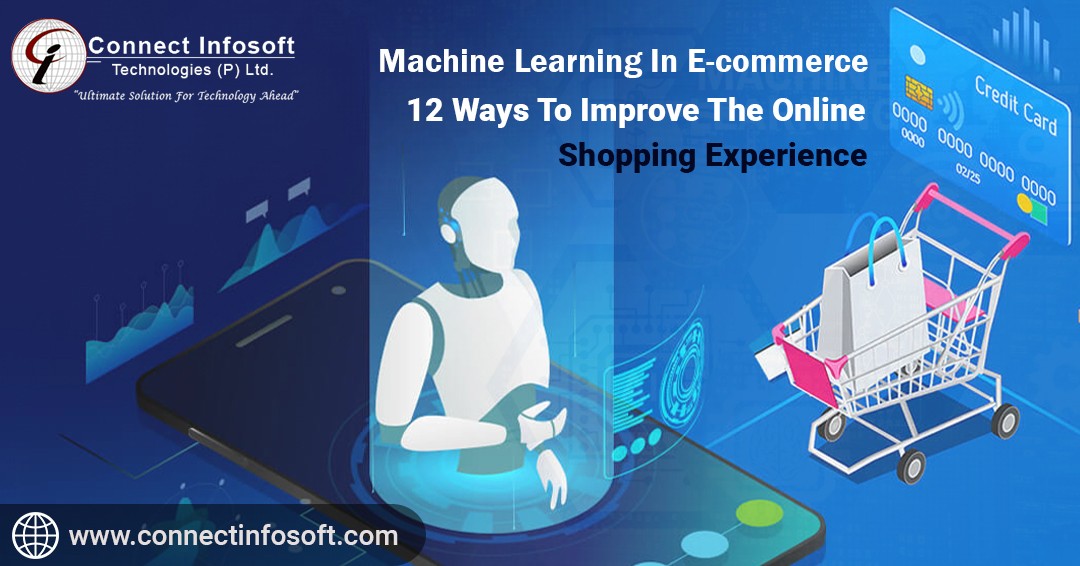-
Machine Learning in eCommerce 12 Ways to Improve the Online Shopping Experience-Connect Infosoft
In today’s digital age, eCommerce has become a thriving industry, with millions of people worldwide relying on online shopping for their purchasing needs. To stay competitive in this rapidly evolving landscape, businesses must constantly find innovative ways to enhance the online shopping experience for their customers. One powerful tool that is revolutionizing the eCommerce sector is machine learning.
In this blog, we will explore 12 ways in which machine learning, offered by Connect Infosoft, can be leveraged to improve the online shopping experience.
1. Personalized Product Recommendations:
Machine learning algorithms can analyze customer behavior, purchase history, and preferences to provide personalized product recommendations. By understanding individual customer preferences, businesses can offer relevant and targeted suggestions, increasing the likelihood of conversion.
2. Dynamic Pricing:
Machine learning algorithms can analyze market trends, competitor pricing, and customer behavior to dynamically adjust product prices. This enables businesses to optimize pricing strategies and offer competitive prices that attract customers while maximizing profitability.
3. Fraud Detection:
Machine learning algorithms can detect patterns and anomalies in transaction data to identify fraudulent activities. By implementing fraud detection systems, businesses can protect themselves and their customers from potential financial losses and maintain a secure online shopping environment.
4. Chatbots and Virtual Assistants:
Machine learning-powered chatbots and virtual assistants can provide personalized customer support, answering queries, and guiding customers through their shopping journey. These intelligent assistants can provide real-time assistance, enhance customer satisfaction, and reduce the need for human intervention.
5. Customer Sentiment Analysis:
Machine learning algorithms can analyze customer feedback, reviews, and social media data to gain insights into customer sentiment. This information can help businesses understand customer preferences, identify areas for improvement, and tailor their offerings accordingly.
6. Demand Forecasting:
Machine learning algorithms can use previous sales data, market trends, and external factors to accurately estimate demand. This enables businesses to optimize inventory management, ensure product availability, and minimize stockouts or overstock situations.
7. Visual Search:
Machine learning-powered visual search allows customers to search for products using images instead of text. By analyzing the visual features of images, businesses can offer a more intuitive and convenient search experience, helping customers find what they are looking for quickly.
8. Voice Commerce:
Machine learning and natural language processing enable voice assistants to understand and process customer voice commands. Voice commerce simplifies the shopping process, allowing customers to make purchases using voice instructions, making the experience more seamless and hands-free.
9. Customer Segmentation:
Customers can be segmented using machine learning algorithms based on a variety of criteria, including demographics, behavior, and purchase history.
By understanding customer segments, businesses can tailor marketing campaigns, promotions, and offers to specific groups, increasing engagement and conversion rates.
10. Intelligent Product Categorization:
Machine learning algorithms can automatically categorize products based on their attributes, descriptions, and images. This ensures that products are organized effectively, making it easier for customers to navigate and find what they are looking for, improving the overall user experience.
11. Inventory Optimization:
Machine learning algorithms can analyze sales patterns, customer demand, and external factors to optimize inventory levels. By accurately predicting demand and adjusting inventory accordingly, businesses can reduce carrying costs, minimize stockouts, and improve order fulfillment.
12. Upselling and Cross-selling:
Machine learning algorithms can analyze customer purchase history and behavior to identify opportunities for upselling and cross-selling. By recommending complementary or higher-value products, businesses can increase average order value and drive additional revenue.
Conclusion:
Machine learning is revolutionizing the eCommerce industry by providing businesses with powerful tools to enhance the online shopping experience. From personalized recommendations and dynamic pricing to fraud detection and intelligent assistants, Connect Infosoft offers a wide range of machine learning solutions that can transform your eCommerce business. By leveraging these technologies, businesses can improve customer satisfaction, increase conversions, and stay ahead of the competition in the ever-evolving world of online retail. Embracing machine learning in eCommerce is not just a trend; it’s a strategic imperative for businesses seeking sustainable growth and success in the digital marketplace. Contact Connect Infosoft today to unlock the full potential of machine learning in your eCommerce operations.
Tags: Machine Learning in eCommerce 12 Ways to Improve the Online Shopping Experience, Hire Machine Learning Developer, Machine Learning Development in India, Machine Learning Developer, Looking For Machine Learning Developer, Looking For Machine Learning Dev Team, Hire Machine Learning Developer, Data Analytics Company, Python Development
Share Profile







